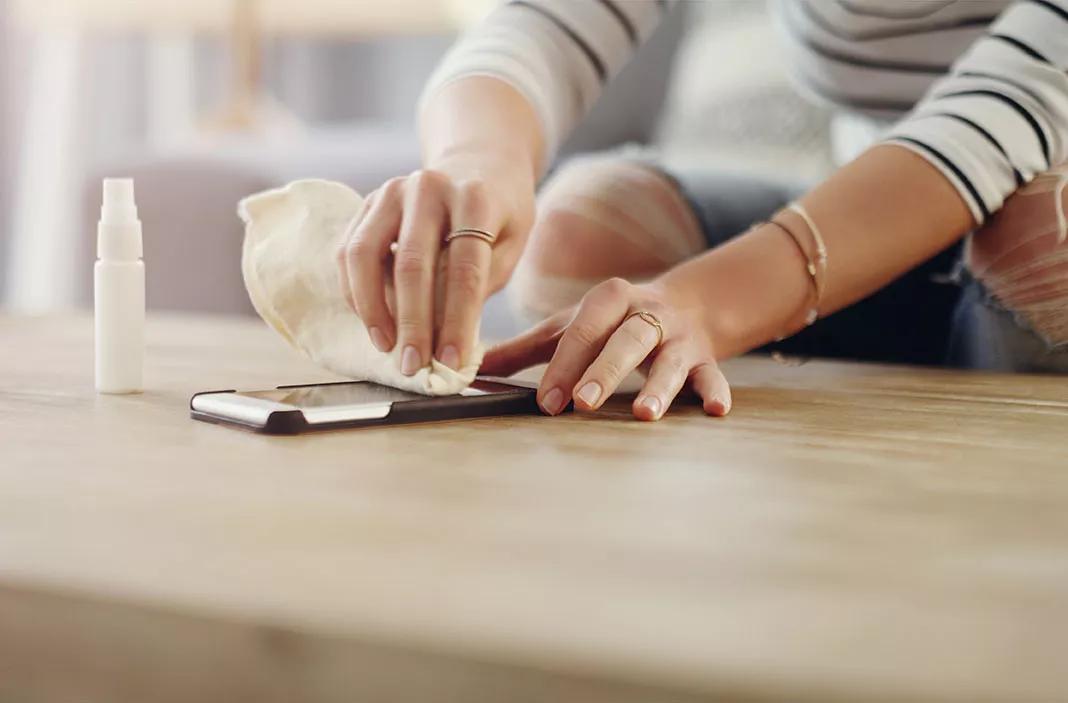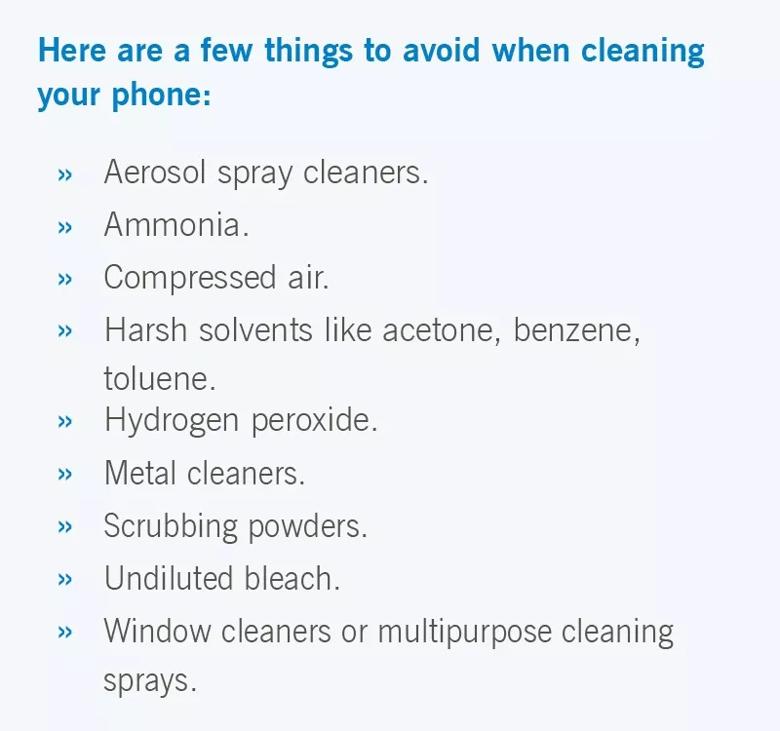Reduce the risk of exposing yourself and those you love to germs

Image content: This image is available to view online.
View image online (https://assets.clevelandclinic.org/transform/856caad4-7544-475a-b43b-91b7babcaa7d/GettyImages-1187135272_jpg)
Woman sanitizing her phone.
It’s been estimated that the average American is on their mobile phone for more than five hours a day. Not surprising given these devices have become our lifelines — connecting us to family, friends and the world around us. But after all of the phone calls, cat videos, likes, shares and occasional mythical creature captures, have you ever thought about just how grimy your mobile phone gets throughout the day? The answer may surprise you.
Advertisement
Cleveland Clinic is a non-profit academic medical center. Advertising on our site helps support our mission. We do not endorse non-Cleveland Clinic products or services. Policy
In a recent study, more than 17,000 copies of bacterial genes were discovered on 27 phones that happened to belong to a group of high school students. Eeek! Considering how many places we go in a day, and how many times we set our phones down, there’s no doubt that they’re most likely covered in — yuck. In fact, cell phones have been reported to have more germs than a toilet seat. Seven times more to be exact.
Some of the bacteria that can be found on mobile phones include:
If you haven’t been cleaning your mobile phone on a regular basis, we’re pretty sure you’ll want to start doing so now. According to family medical physician Dan Allan, MD, bacteria can remain on surfaces for hours, days or even weeks. To give you a better idea of what could be lingering on your phone, Dr. Allan says E. coli can survive hours or even an entire day, while salmonella and campylobacter can survive for about four hours. Hepatitis A and C. diff bacteria can survive for months, and MRSA, or staph, can last for weeks. As for coronavirus, Dr. Allan says the virus can live on surfaces for a few days.
“E. coli, salmonella, campylobacter and C. diff can cause diarrhea and can occur if you’re handling your phone after NOT washing your hands properly when you’re in the bathroom. Or in the case of many teens, using the phone in the bathroom,” explains Dr. Allan.
Advertisement
Cleaning your phone regularly is one of the smartest things you can do to prevent the spread of germs. Think about it. You wash your hands a lot. But what good will that do if you’re using a bacteria-covered phone? By routinely cleaning your phone, you can lessen the chances of passing those germs on to your friends, family or even your coworkers.
Now that we’ve gone over the why, we’re going to cover the how. Here are some helpful tips for cleaning your phone.
To start, don’t spray your phone down with disinfectant. That is a no-no. You could damage the screen and the phone’s protective shell, ports and coatings that were designed to protect the screen and internal components. To be on the safe side, always refer to the owner’s manual or manufacturer’s website before you start to prevent any cleaning mishaps.

Image content: This image is available to view online.
View image online (https://assets.clevelandclinic.org/transform/2acc6b91-f111-4524-b1fb-0990024912c4/table-HEpost-cleanPhone1-800x750-1_jpg)
When you’re ready to start cleaning, grab a non-abrasive cleaning cloth or wipe that can be used to clean your phone (these wipes tend to have 70% isopropyl alcohol). If you don’t have phone-friendly cleaning wipes, you can make a cleaning solution of ½ cup distilled water and ½ cup of isopropyl alcohol, 70%. Put the solution in a spray bottle and shake the bottle before use.
After mixing the cleaning solution, do not spray your phone with it. Instead, lightly mist your towel with the solution. Remember, the towel (or cleaning wipe) should not be soaking wet or you’ll destroy your phone. Take the towel and gently wipe down the front and back of your phone. Let your phone dry for about 15 minutes and then put it back in the case.
A clean phone deserves a clean home. So, while your phone is drying, you can deep clean your case. How you do so will depend on the material.
You can clean a hard plastic phone case with a wipe or the alcohol-water solution that was mentioned earlier. Use a cotton swab with the solution on it to get into any openings for the camera and buttons (again, make sure the swab isn’t soaked). When you’re finished, allow the case to dry completely and reinsert your phone.
Silicone cases are durable and can stand up to being submerged in water. To clean your silicone phone case, mix a little dishwashing detergent with warm water and use a soft towel to clean the interior, exterior and any textured edges. Rinse the case thoroughly and allow it to dry completely before you put your phone back in it. In between cleanings, you can wipe the case down with a cleaning wipe or the alcohol-water solution mentioned above.
If you have a case that is made with leather or another high-quality material, you’ll want to follow the manufacturer’s instructions when cleaning. These materials may require cleaners that were formulated specifically for them.
Your earbuds, charger and phone stand get a workout every day, so don’t leave them out of your phone cleaning routine. You can use a wipe or towel that’s been lightly misted with your alcohol-water solution to wipe them down. Just make sure they’re completely dry before you use them again.
Advertisement
Dr. Allan recommends that you should wipe down your phone daily or more if you believe that it may have been exposed to contamination. In addition to this, he recommends routinely cleaning all surfaces and objects that you come into contact with throughout the day — counters, doorknobs, refrigerator handles, remote controls, your computer keyboard and even your keys.
And again, preventing the spread of germs starts with proper hand hygiene. While hand sanitizer is in demand right now, soap and water are still more effective. “Handwashing is always better than hand sanitizer – certain infections (like norovirus) are not killed by hand sanitizer and must be washed off,” Dr. Allan says.
Advertisement

Sign up for our Health Essentials emails for expert guidance on nutrition, fitness, sleep, skin care and more.
Learn more about our editorial process.
Advertisement
Leaving footwear on invites germs, bacteria, toxins and other unwanted guests into your home
Some dryers spread germs instead of removing them
Wash your hands, skip the buffet and don’t wash your poultry
The short answer from an infectious disease specialist
Cross contamination is common in the kitchen
While the sponge can become lodged with skin cells (and other gross things), make sure you dry it daily and clean once a week
Unfortunately, putting your jeans in the freezer doesn’t kill germs, and it definitely doesn’t get them clean
Don’t wipe away your clean with a dirty towel
Type 2 diabetes isn’t inevitable with these dietary changes
Applying a hot or cold compress can help with pain
Pump up your iron intake with foods like tuna, tofu and turkey